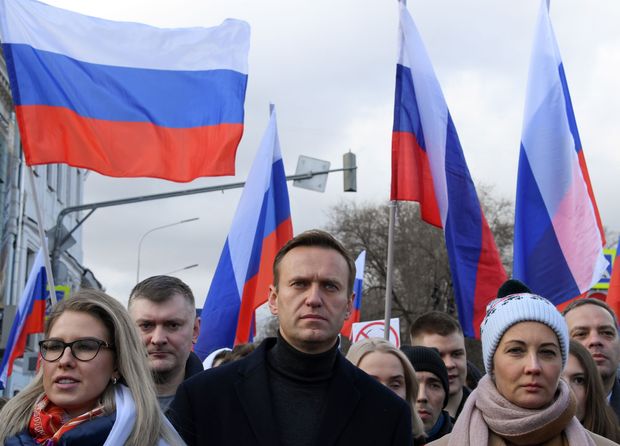
Russian opposition leader Alexei Navalny with his wife, in hat, and supporters in Moscow in February.
Photo: kirill kudryavtsev/Agence France-Presse/Getty Images
BERLIN—Germany signaled it is prepared to reconsider its Nord Stream 2 gas pipeline project with Russia in light of the poisoning of Russian opposition figure Alexei Navalny, who was roused from an induced coma on Monday.
Chancellor Angela Merkel, who has been a champion of the pipeline project, couldn’t rule out including Nord Stream 2 in possible sanctions against Russia should Moscow fail to investigate Mr. Navalny’s poisoning, a spokesman for the German leader said.
Germany’s reaction would depend on Russia’s actions in the coming days, the spokesman said.
Berlin’s Charité hospital said Monday that Mr. Navalny had been awakened from a coma and was responsive. German scientists determined last week that the opposition figure had been poisoned with Novichok, a Soviet-era military-grade nerve agent.
Mr. Navalny, who was flown to Berlin for treatment with the help of the German government on Aug. 22, could still suffer long-term damage, the hospital said. He is now being weaned off mechanical ventilation as his condition improves, according to the clinic.
The case brought a new low in relations between Berlin and Moscow, which have rapidly deteriorated since Russia’s invasion and partial annexation of Ukraine in 2014.
After Mr. Navalny, a critic of Russian President Vladimir Putin, was flown to Berlin, and with Russia showing little interest in investigating the case, members of Ms. Merkel’s cabinet including Foreign Minister Heiko Maas and several lawmakers on both sides of the aisle said the Nord Stream 2 project should be reconsidered or abandoned.
More on Navalny
Until Monday, Ms. Merkel had rejected any such suggestion. On Aug. 28, she said that the issue of Mr. Navalny’s poisoning should be decoupled from economic cooperation with Russia. “Our opinion is that it must be finished…it’s a project by economic actors from Russia and Europe,” she told a press conference when asked if work on Nord Stream 2 should be halted.
Nord Stream 2, running alongside an older pipeline on the same route, is set to double Moscow’s gas exports to Germany. The project is nearing completion but is currently suffering delays because of U.S. sanctions imposed in December. The pipeline is also controversial in Europe, which has tried to reduce its dependence on Russian gas.
The poisoning or Mr. Navalny has made further U.S. sanctions, possibly in cooperation with the EU, more likely, said Benjamin L. Schmitt, Harvard postdoctoral fellow and former European energy-security adviser at the State Department.
“Especially in light of the Navalny poisoning by Novichok, it’s increasingly likely that the U.S. and EU may well pass joint sanctions to make sure that the pipeline is never completed,” Mr. Schmitt said.
The Kremlin has denied any responsibility in Mr. Navalny’s poisoning and has cast doubt on German doctors’ conclusion that he was poisoned at all, referring to Russian doctors’ initial assessment that the opposition politician was suffering from some metabolic imbalance, such as low blood sugar.
Mr. Navalny, who fell critically ill while on board a domestic commercial flight in Russia, was briefly treated at a local hospital before being transferred to Germany at the request of his family after Ms. Merkel herself suggested the move.
He underwent tests at Berlin’s Charité hospital, which sent medical samples to clinics around the world. A specialist military laboratory in Germany confirmed on Aug. 24 that he had been poisoned with Novichok, a nerve agent that was developed in the Soviet Union and is now banned.
Russian officials have started a preliminary probe into Mr. Navalny’s illness but haven’t opened a full-fledged investigation. Mr. Navalny’s spokeswoman, Kira Yarmysh, said she requested an investigation when Mr. Navalny fell ill in late August.
Kremlin spokesman Dmitry Peskov said Monday that Moscow was pleased with Germany’s decision to send information on Mr. Navalny’s condition and the course of his recovery. He also said he saw no risk to Germany blocking the Nord Stream 2 gas pipeline, calling proposals for Germany to rethink its cooperation with Moscow absurd.
“Keeping in mind the importance of this situation, we believe the information [on Mr. Navalny] will be handed over in the coming days,” Mr. Peskov said. “We’re waiting for it very expectantly.”
Mr. Peskov said an investigation could be started if Moscow receives information on what exact substance German doctors concluded had poisoned Mr. Navalny.
Mr. Navalny’s wife, Yulia Navalnaya, writing on Instagram over the weekend, praised the work of German doctors and criticized Russian state-backed attempts to look into the cause of her husband’s illness, calling them a campaign to serve Russian authorities.
Write to Bojan Pancevski at bojan.pancevski@wsj.com and Thomas Grove at thomas.grove@wsj.com
Copyright ©2020 Dow Jones & Company, Inc. All Rights Reserved. 87990cbe856818d5eddac44c7b1cdeb8


